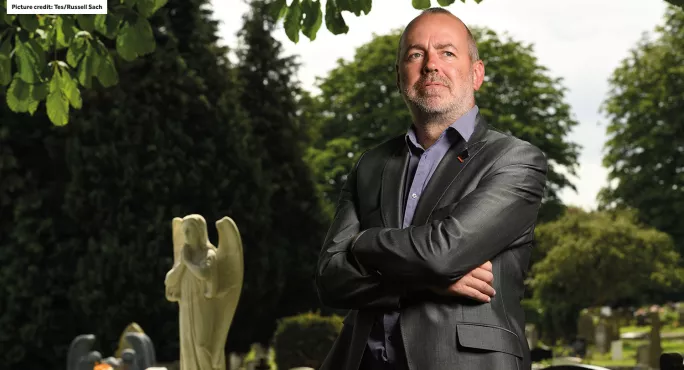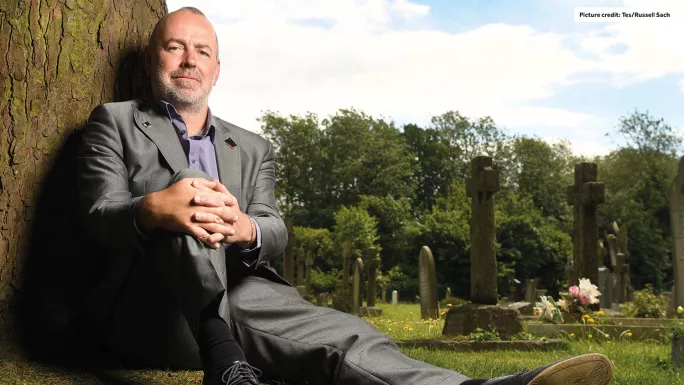- Home
- TES talks to... Stuart Falconer
TES talks to... Stuart Falconer

On 5 May 2015, Stuart Falconer was told that his 15-year-old son Morgan had taken his own life. Falconer had noted no warning signs, no mental health issues of which he was aware. He thought his son, who had killed himself the night before some important GCSE exams, was a normal, happy teenager.
“It was an enormous shock to me because there were no signs or signals that he was contemplating such a drastic action,” he says.
In search of answers during the following days and weeks, he discovered that his situation was actually more common than he had first realised.
“In the immediate aftermath of his death, I spent a lot of time searching online about why people kill themselves and I realised that this is happening all over the country,” Falconer explains. “There are lots of young people taking their own lives and leaving people behind with an enormous gap, so I just felt - and maybe it was a personal guilt thing - that I couldn’t just sit back and do nothing. I felt that I should do what I could and try to prevent other people going through the same thing.”
Falconer, who is a human resources consultant by training, got together with two other parents, who had also lost their teenage sons to suicide, to create the OLLIE Foundation, a registered charity that funds suicide-intervention skills training for adults working with young people.
Since it was founded in 2016, OLLIE - which stands for “one life lost is enough” - has trained close to 300 teachers. Falconer argues that this is just a drop in the ocean of what is needed, though. Suicide is the biggest killer of young people under the age of 35 in the UK; in 2014 alone, 1,556 young people took their own lives. These are shocking headline statistics, but Falconer believes teenage suicide is still a woefully under-reported and avoided subject. The initial aspiration for OLLIE was merely to try to change this by organising a fundraising event to increase awareness of the growing number of suicides among young people.
But due to demand for expertise in this area, the charity’s focus shifted from promoting awareness to providing training to people who work with young people - whether they be teachers or youth group workers. To do this, Falconer wanted to offer the best training out there. So the charity paid to send two people to Canada to be trained by a public-service corporation called LivingWorks. A world leader in understanding and preventing suicide, the organisation has devised two training courses: ASIST (applied suicide-intervention skills training) and SafeTALK.

“SafeTALK basically gives people the skills and the confidence to have a conversation with someone who may be suicidal,” says Falconer.“It allows someone to have a conversation with somebody about their internal emotions and feelings, and that ultimately may well end in the question being asked, ‘Are you thinking about taking your own life?’ We’re hoping that under those circumstances it will be a relief to someone to actually say, ‘Yes, I’m feeling terrible.’”
Specific training includes information on common “hidden” requests for help that can be missed in these conversations (such as specific behaviours or attitudes), and structured conversation techniques. ASIST is a two-day course that’s designed around keeping someone safe. “So if someone is feeling suicidal, what we want to do is keep that person safe now, today, tomorrow, this week, next week and next month, until the relevant professionals can get involved to offer advice, support and solutions to someone who is suicidal,” explains Falconer.
ASIST trainees are taught to follow a pathway - developed by psychiatrists, psychologists and social workers - to create a safety framework specific to the vulnerable person. During the intervention, various skills are used to turn the person’s thoughts away from suicide towards hope for something different. Choices are discussed and help is provided to encourage the person to choose something different from taking their life.
Typically, OLLIE is approached by a headteacher or school leader, who asks the charity’s trainers to come in and train half a dozen or so teachers in ASIST. This would usually include the head of safeguarding, the head of pastoral care and key members of staff. In addition, the school would have a number of teachers trained in SafeTALK.
But while the courses the charity offers are vitally important, Falconer says that the most efficient way of dealing with this issue isn’t just to give members of staff training.
“If you are looking for a tick-box exercise to say that you’ve trained a couple of people in SafeTALK, we can do that, but I’m not convinced that’s the answer. The training has got to be part of a school’s wider strategy around the wellbeing of your kids,” he says. “So now we go into schools and we say, ‘Yes, we can offer you this training, but what are you doing about your kids now? Are you providing resilience and wellbeing training? What are you doing right now and how can we support you to deliver that strategy?’”
He believes that, currently, not enough schools are doing as much as they should be in this area. One school he has worked with trained all 120 teachers; another, just a single teacher. Part of the problem - where numbers are low or schools opt out altogether - he thinks, is a reluctance to be open about what is admittedly a very sensitive topic. But it’s also about a lack of money and time.
‘People are in denial’
“I think there is denial and I understand why people are reluctant to talk about this subject because it is so shocking,” says Falconer. “To date, I’ve had a variety of different responses from schools. Some say, ‘We just can’t afford it,’ or, ‘We can’t find the time for people to attend the training,’ through to schools that say, ‘Great. We want to train 120 of our teachers.’ We’re at that stage right now where all we can do as a charity is be consistent and eventually the momentum will spread through all schools, so they will think they have no choice but to do this.”
He has ambitions for OLLIE to create some kind of “kitemark” that would be a minimum standard that any organisation could adopt if they wanted to be deemed a “suicide-safer community”.
Considering the problems he has already experienced in attracting school buy-in, this outcome might seem a long way off. But Falconer is hopeful that things will begin to get easier - and the key to that shift, he thinks, will be the students themselves.
He cites a recent encounter in which a group of girls decided to make a presentation to the rest of their year group about teenage suicide and the work of OLLIE. It was, he says, a powerful and moving example of young people wanting these conversations and this support, and he hopes that eventually schools will listen.
“To have teenagers approach us and say, ‘What can we do to help,’ is overwhelming because they’re the ones who recognise this is an issue,” says Falconer. “They are taking the message out to their own communities and that gives me all the encouragement in the world.”
Simon Creasey is a freelance journalist
Keep reading for just £1 per month
You've reached your limit of free articles this month. Subscribe for £1 per month for three months and get:
- Unlimited access to all Tes magazine content
- Exclusive subscriber-only stories
- Award-winning email newsletters



